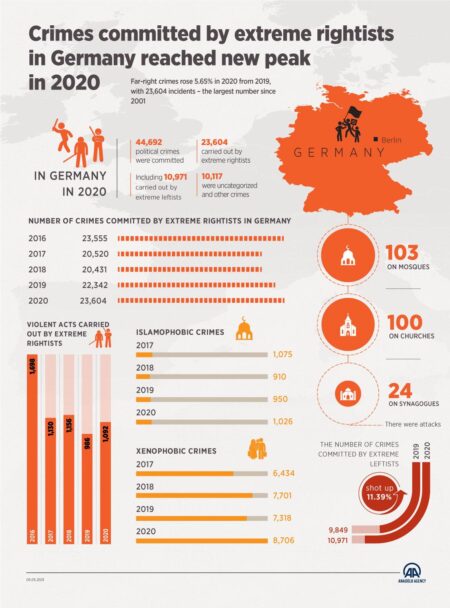After fascist regimes collapse, societies face a challenging path to rebuild democracy and mend deep-seated divisions. Truthout explores the complex struggles that emerge in the aftermath of fascism’s fall
Browsing: extremism
Police allege that a man charged with hate speech at a Sydney protest has ties to a disbanded neo-Nazi group. Authorities are intensifying their investigation as concerns over escalating extremist activity grow stronger
A recent TPUSA straw poll spotlighted “Radical Islam” as the top threat, highlighting rising concerns among participants over escalating global security challenges, according to The Jerusalem Post
Australian police have uncovered that the Bondi Beach attackers were motivated by ISIL-inspired radicalization, ignited by online propaganda. Authorities are now intensifying their investigation into potential links with broader extremist networks. (Al Jazeera)
Tensions are soaring across Australia as far-right groups become more “emboldened like never before.” Authorities are raising urgent alarms about the escalating threats amid a wave of extremist activities sweeping the country
Former French President Nicolas Sarkozy has dismissed concerns about the far-right National Rally, boldly declaring the party “not a danger” to France. His remarks come amid growing unease over the rising wave of nationalist sentiment sweeping the nation
Rallies erupted across Germany as crowds flooded the streets to confront the rise of the far-right AfD youth group. Determined demonstrators united, raising their voices in a powerful stand against the spreading danger of extremist ideologies creeping into the heart of the nation’s politics
PBS explores the explosive rise of Germany’s New Right, uncovering dynamic nationalist movements that are reshaping the country’s political landscape. This dramatic shift raises urgent questions about the future of democracy and social cohesion in Europe’s largest economy
An expert on Antifa at Rutgers University has fled the US after being targeted by a surge of chilling death threats. These menacing warnings intensified dramatically as tensions soared around his groundbreaking research and bold public commentary on extremist groups
German authorities have launched coordinated raids across several states, targeting suspected far-right extremists. These bold operations aim to dismantle dangerous networks planning violent attacks, highlighting the urgent and growing threat of right-wing radicalization
A recent Cato Institute report uncovers a surprising truth: politically motivated violence in the United States remains rare, despite escalating political tensions. The study highlights that most incidents fail to ignite widespread conflict, offering a glimpse of resilience amid turmoil
Calls to ban Germany’s far-right AfD party are intensifying amid rising concerns over its extremist connections, even as the party skyrockets to unprecedented highs in recent polls, sending shockwaves through Germany’s political landscape like never before
Germany has witnessed a dramatic 46% spike in far-right crimes, official data reveals. This alarming rise highlights growing concerns about extremist violence and the urgent need for more robust preventive measures
Germany is grappling with a shocking 40% surge in politically motivated crimes, a trend largely fueled by the alarming rise of far-right ideologies. Authorities are sounding the alarm over the escalating influence of extremism within the nation’s political arena, raising serious concerns about its impact on society.
In a significant crackdown, German authorities have dismantled a far-right group linked to plans for violent attacks, resulting in the arrest of five teenagers. This bold operation highlights the persistent worries surrounding extremist activities within the nation. As investigations continue, the focus remains on ensuring safety and security for all.
Germany has taken a bold stand by banning a far-right group linked to the extremist Reich Citizens movement, highlighting serious concerns for democracy and public safety. This decisive action reflects the government’s unwavering dedication to fighting against extremist ideologies that threaten the fabric of society
Germany’s Federal Office for the Protection of the Constitution has made a significant move by suspending the “extremist” classification of the Alternative for Germany (AfD) party. This pivotal decision arrives at a time when discussions about the party’s far-right inclinations and its influence on German politics are heating up
Germany’s domestic intelligence agency has officially designated the Alternative for Germany (AfD) party as a “confirmed rightwing extremist” group. This significant classification underscores escalating worries about the party’s sway and the increasing tide of extremist sentiments sweeping across the nation
Germany’s recent decision to label the far-right Alternative for Germany (AfD) party as an “extremist” group has ignited a wave of criticism from the United States. Detractors contend that this classification threatens the very essence of democratic dialogue, fueling fears of political repression and stifling diverse viewpoints
U.S. Senator Marco Rubio has stirred controversy by branding German policies as “tyranny in disguise,” all while throwing his support behind the far-right Alternative for Germany (AfD) party. This bold stance has drawn sharp criticism, with many arguing that his remarks reveal a concerning affinity for extremist ideologies.



















